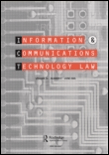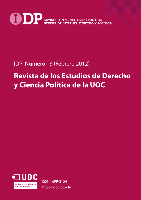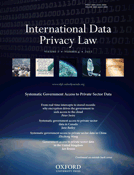
Information & Communications Technology Law
Scope & Guideline
Pioneering Research in Digital Law and Ethics
Introduction
Aims and Scopes
- Regulatory Frameworks for Emerging Technologies:
The journal explores the legal implications of new technologies such as artificial intelligence, blockchain, and IoT, providing insights into how existing laws adapt or need to evolve to address these innovations. - Data Protection and Privacy Law:
A core area of focus is the analysis of data protection regulations, including GDPR and its global implications, emphasizing the balance between privacy rights and technological advancements. - Intellectual Property Rights in the Digital Age:
The journal examines the challenges posed by digital content, copyright issues, and the protection of intellectual property in an increasingly interconnected and digital world. - Cybersecurity and Law Enforcement:
The impact of cybersecurity threats and the legal frameworks governing law enforcement's response to these threats are critically analyzed, particularly in relation to privacy and civil liberties. - Social Justice and Digital Rights:
The journal addresses issues of social justice, focusing on the rights of individuals in the digital space, including freedom of expression, hate speech, and the legal responses to online harms.
Trending and Emerging
- Artificial Intelligence and Legal Implications:
Recent publications highlight a growing interest in the legal implications of artificial intelligence, including liability, ethical considerations, and regulatory frameworks, as AI technologies become more pervasive. - Data Governance and Collective Rights:
Emerging discussions on collective data governance, particularly in regions like Africa, indicate a trend towards understanding how communities can manage and protect their data rights in a digital economy. - Privacy and Surveillance in the Digital Age:
There is an increasing focus on the implications of surveillance technologies and privacy laws, particularly concerning facial recognition and data privacy regulations, reflecting societal concerns over privacy in a digital world. - Content Moderation and Hate Speech Regulation:
The journal is increasingly addressing the challenges of content moderation and the legal frameworks needed to manage hate speech and misinformation on digital platforms, a response to growing societal demands for accountability. - Cybersecurity Legislation and Policy Development:
Recent papers emphasize the importance of developing robust cybersecurity legislation to protect individuals and organizations from the growing threat of cyberattacks, indicating a trend towards proactive legal measures.
Declining or Waning
- Broad Discussions on Traditional Cybercrime:
Earlier publications often focused extensively on traditional forms of cybercrime; however, the increasing complexity of technology-related legal issues has led to a shift towards more nuanced discussions of specific technologies and their implications. - General Theoretical Analyses of ICT Law:
There appears to be a waning interest in broad theoretical frameworks surrounding ICT law, as more specific and practical applications of legal principles in technology contexts are becoming the focus. - Regulatory Approaches to Established Technologies:
There is a noticeable decrease in articles discussing regulatory frameworks for well-established technologies, such as basic internet governance, as the journal shifts towards addressing newer technologies and their unique challenges. - Emerging Trends in Traditional Media Law:
While traditional media law remains relevant, discussions related to it in the context of emerging technologies are diminishing, as the focus has shifted to how digital media is reshaping legal landscapes. - Historical Analyses of ICT Law:
The journal has seen a reduction in papers that provide historical perspectives on ICT law, indicating a movement towards contemporary issues and future-oriented discussions.
Similar Journals

Vestnik Permskogo Universiteta-Juridicheskie Nauki
Bridging National and International Legal PerspectivesVestnik Permskogo Universiteta-Juridicheskie Nauki, published by the Perm State National Research University, serves as a prominent platform for the dissemination of legal scholarship since its inception. With an Open Access policy implemented in 2009, this journal offers a wide range of legal studies, including comparative law, constitutional law, and international law, making it an essential resource for researchers, academics, and practitioners in the field. Although it is a relatively young publication, its commitment to quality and accessibility has established it as a respected voice in jurisprudence, contributing significantly to both national and international legal discourse. Researchers and students alike will find valuable insights within its pages, encompassing the latest developments and theoretical advancements within Russian and global legal systems. For those looking to stay informed on current legal issues and academic debates, this journal is a must-read.

IDP-Internet Law and Politics
Shaping Tomorrow's Digital Governance Today.IDP-Internet Law and Politics, published by UNIV OBERTA CATALUNYA, is an esteemed open-access journal established since 2005, committed to exploring the interdisciplinary intersection of law, politics, and technology in the internet age. With its ISSN 1699-8154 and E-ISSN 1699-8154, this journal not only contributes to scholarly discourse but also embraces the evolving digital landscape that shapes our societies. As of 2023, it has garnered notable rankings, positioning it within Q2 in both the law and sociology/political science categories, while holding a Q3 status in the miscellaneous category of computer science, reflecting its comprehensive scope and relevance across multiple disciplines. The journal's accessibility facilitates the dissemination of emerging research and innovative ideas, making it a key resource for academics, practitioners, and students who aim to understand and shape the future of internet governance and digital rights. With its ongoing commitment to advancing knowledge from 2019 to 2024, IDP represents a significant contribution to contemporary debates, ensuring that legal and political perspectives remain at the forefront of technological change.

EUROPEAN JOURNAL OF HEALTH LAW
Shaping the future of health policy through rigorous scholarship.The European Journal of Health Law, published by Brill, stands as a pivotal resource for scholars and practitioners at the intersection of health policy and law since its inception in 1994. This esteemed journal, with an ISSN of 0929-0273 and an E-ISSN of 1571-8093, delves into pressing issues affecting health law across Europe and beyond, providing a platform for rigorous scholarly discourse. It is categorized in the Q4 quartile for Health Policy and Q3 for Law, highlighting its crucial role in advancing knowledge in these fields. While the journal is not an open-access publication, its content remains vital for researchers, students, and professionals seeking to navigate the complexities of health law amidst evolving legal frameworks. With an increasing focus on interdisciplinary studies, the journal aims to foster a deeper understanding of legal principles and their application to health care governance, policy-making, and ethical considerations, making it an indispensable reference for those committed to enhancing health law practice and scholarship.

HASTINGS LAW JOURNAL
Exploring Contemporary Legal IssuesThe Hastings Law Journal, published by the University of California, is a distinguished legal academic journal that has been a cornerstone in the field since its inception in 1974. It holds an impressive position in the Scopus rankings, sitting at #239 out of 685 in the Social Sciences - Law category, reflecting a strong 65th percentile. This journal primarily serves as a platform for scholarly discourse on contemporary legal issues, promising to foster critical thought and progressive legal interpretations that resonate within the legal community and beyond. While it does not follow an Open Access model, the Hastings Law Journal remains widely accessible through various academic libraries and databases, ensuring its reach among researchers, practitioners, and students. The journal's commitment to high-quality, peer-reviewed content positions it as an essential resource for those seeking to stay informed about the evolving landscape of law and legal scholarship.

International Data Privacy Law
Pioneering Research at the Intersection of Law and TechnologyInternational Data Privacy Law, published by Oxford University Press, is a premier journal dedicated to advancing the understanding and application of privacy law in a rapidly evolving digital landscape. Since its inception in 2011, the journal has strived to provide a scholarly platform for the exploration of key issues in data protection, privacy rights, and regulation, making it essential reading for legal researchers, professionals, and students alike. With a commendable Q1 ranking in Law for 2023 and a notable position among the top tier of social sciences journals in Scopus, the journal establishes itself as a leading authority in the field, boasting a remarkable 94th percentile ranking out of 1,025 law journals. By publishing high-quality research articles, expert analyses, and policy discussions, International Data Privacy Law plays a crucial role in shaping the discourse around data privacy, ensuring that its audience stays informed about the latest developments and trends in this vital area of law. Explore the dynamic intersection of technology and law through our rigorous and insightful publications that continue to influence policy and practice across the globe.

National Taiwan University Law Review
Fostering Legal Discourse Across AsiaNational Taiwan University Law Review, with ISSN 1812-6324, is a prestigious academic journal published by the NATIONAL TAIWAN UNIVERSITY COLLEGE OF LAW. As a pivotal platform in the field of law, this journal aims to foster scholarly discourse and promote the exchange of ideas regarding legal theories, practices, and developments, particularly within the context of Taiwan and the broader Asian legal landscape. Although it does not currently offer open access, its selectivity ensures a high standard of peer-reviewed research, appealing to researchers, legal practitioners, and students alike. The journal's commitment to exploring contemporary legal challenges and ideologies positions it as an essential resource for those seeking to enhance their understanding of the dynamic legal systems in Asia and beyond. Located in Taipei City, Taiwan, the National Taiwan University Law Review invites contributors and readers who are passionate about advancing legal scholarship and practice.

INDIANA LAW JOURNAL
A Legacy of Excellence in Legal PublishingINDIANA LAW JOURNAL, a premier publication in the field of law, serves as a vital platform for scholarly discourse and legal scholarship. Established in 1973 and originating from the Indiana University School of Law in Bloomington, this esteemed journal publishes a diverse range of articles, essays, and commentary from both established and emerging legal scholars. With an impressive Scopus Rank of #350 out of 1025 in the Social Sciences domain, placing it in the 65th percentile, the journal is recognized for its contributions to the legal academic community. Its 2023 category quartile ranking of Q2 underscores its significance and relevance, ensuring that published works are widely acknowledged and cited. Although not an open access journal, the INDIANA LAW JOURNAL is committed to fostering robust academic exchanges and enhancing understanding in various legal fields, making it an indispensable resource for researchers, professionals, and students alike. With a history of convergence in publication timelines, it continues to evolve in response to the continually changing legal landscape.

WASHINGTON LAW REVIEW
Shaping Tomorrow's Legal Discourse TodayWASHINGTON LAW REVIEW, published by the University of Washington School of Law, is a premier legal journal that plays an essential role in the dissemination of scholarly work in the field of law. With a longstanding commitment to excellence, this journal has been pivotal in shaping legal discourse since its inception. It is ranked in the Q2 quartile in Law, as per 2023 evaluations, and holds a notable position within the top 54th percentile of its category on Scopus. The journal’s extensive publication history, covering years from 1973 to 2024, provides a rich repository of legal scholarship, making it a valuable resource for researchers, practitioners, and students alike. While the journal does not currently offer open access, its authoritative articles cover a diverse array of topics within legal studies, ensuring that the most relevant and impactful discussions are accessible to the academic community and beyond. For those looking to stay informed about cutting-edge legal issues and advancements, WASHINGTON LAW REVIEW remains an indispensable asset in the pursuit of knowledge and advocacy in the realm of law.

Australian Intellectual Property Journal
Championing Excellence in IP Research and EducationThe Australian Intellectual Property Journal, published by LAWBOOK CO LTD, is a premier academic platform dedicated to the scholarly examination of intellectual property law in Australia and beyond. With its ISSN 1038-1635, this journal serves as an essential resource for researchers, legal professionals, and students alike, aiming to foster a deeper understanding of the complexities surrounding intellectual property rights, policies, and practices. Notably, the journal retains a reputation for publishing high-quality, peer-reviewed articles that contribute significantly to the field, making it indispensable for anyone involved in intellectual property research. While currently not open access, the journal encourages the dissemination of knowledge through strategic collaboration and innovative formats. Its address, LEVEL 6, 19 HARRIS ST, PYRMONT, NSW 2009, AUSTRALIA, reflects a commitment to addressing local and international issues in intellectual property, ensuring that the content remains relevant and impactful in a rapidly evolving legal landscape.

BOSTON UNIVERSITY LAW REVIEW
Exploring the forefront of legal innovation.BOSTON UNIVERSITY LAW REVIEW, a premier legal journal based in the United States, is widely recognized for its contributions to the field of law. Since its inception in 1973, this esteemed publication, with ISSN 0006-8047, has provided a platform for rigorous scholarship and innovative discourse in legal theory and practice. Published by BOSTON UNIV LAW REVIEW, the journal is categorized in the top-tier Q1 of law journals as of 2023, reflecting its high impact and relevance in legal scholarship, backed by a solid Scopus ranking of #219 out of 1025 in Social Sciences _ Law, placing it in the 78th percentile. While not an open-access journal, it remains a vital resource for legal researchers, practitioners, and students, offering comprehensive analyses and insights that inform contemporary legal practices. With a commitment to advancing legal understanding, the BOSTON UNIVERSITY LAW REVIEW seeks to engage and inspire critical thought among its readership.